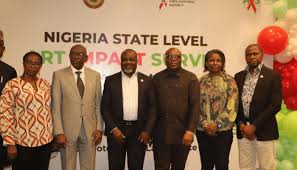

Advocating for Change: Addressing Nigeria’s Multiple Sclerosis Awareness Gap
Nathalie Busari, founder of The Nerve of My Multiple Sclerosis, has voiced significant concerns regarding the limited awareness and information about multiple sclerosis (MS) in Nigeria. Speaking at a media briefing in Lagos on Wednesday, Busari emphasized the urgent need for enhanced education and support for individuals affected by this chronic neurological condition.
“We recognize that there isn’t much information available about multiple sclerosis in Nigeria, so we’re here to raise awareness,” Busari stated. “We want people to have a place to turn to when they experience symptoms or if they already have symptoms but are unsure of what’s happening.”
Multiple sclerosis is an autoimmune disorder where the immune system attacks the protective covering of nerves, leading to communication issues between the brain and the rest of the body. Symptoms can vary widely, including fatigue, difficulty walking, numbness or tingling, and problems with coordination and balance. Early diagnosis and intervention are crucial in managing the disease effectively.
Busari’s organization aims to bridge the information gap and provide a supportive community for those affected by MS in Nigeria. By increasing awareness and understanding of the condition, they hope to encourage early detection and improve the quality of life for individuals living with MS
For more information and resources, individuals are encouraged to reach out to The Nerve of My Multiple Sclerosis and join the growing community dedicated to supporting those impacted by this condition.
Survivor-Turned-Advocate Pushes for Greater Multiple Sclerosis Awareness in Nigeria
Busari, a multiple sclerosis (MS) survivor and advocate, revealed that the initial focus of The Nerve of My Multiple Sclerosis is to establish a strong presence before launching health summits and awareness initiatives. The organization, a dedicated non-profit, is committed to supporting and advocating for individuals living with MS, ensuring they have access to the resources and information they need.
Busari explained that multiple sclerosis is a complex neurological condition in which the immune system—designed to protect the body—mistakenly attacks the central nervous system, specifically targeting the brain and spinal cord. This damage disrupts communication between the brain and the rest of the body, leading to symptoms such as fatigue, vision problems, muscle weakness, and difficulty with coordination.
With limited awareness about MS in Nigeria, Busari’s mission is to educate, empower, and connect those affected, creating a community where people can find the support and information they need to manage their condition effectively. By organizing health summits and awareness days, the organization aims to drive conversations, encourage early diagnosis, and improve access to treatment.
Through advocacy and education, Busari and The Nerve of My Multiple Sclerosis are determined to ensure that no one faces MS alone.
Understanding Multiple Sclerosis: A Disease That Strips Away Protection
Busari painted a vivid picture of how multiple sclerosis (MS) damages the nervous system, likening it to an electrical cable losing its insulation. “When the protective covering around nerves—called myelin—is attacked, it leads to the formation of lesions that expose the delicate nerve fibers underneath, making them vulnerable to damage,” she explained. This disruption interferes with nerve signals, causing a wide range of debilitating symptoms.
Although MS is a progressive disease with no known cure, Busari stressed that treatments are available to slow its progression and manage symptoms. “Without treatment, MS will continue to worsen, impacting mobility, cognition, and overall quality of life,” she warned.
She also debunked the common myth that MS only affects people over 30, citing research that shows it can develop in much younger individuals—even children as young as two years old. This highlights the urgent need for early detection, awareness, and access to treatment to ensure better outcomes for those affected.
By educating the public and breaking misconceptions, Busari and The Nerve of My Multiple Sclerosis are working to create a world where MS is better understood, diagnosed early, and effectively managed.
Breaking Misconceptions: The Urgent Need for MS Awareness and Education in Nigeria
Empowering both medical professionals and individuals is crucial in the fight against multiple sclerosis (MS), says The Nerve of My Multiple Sclerosis member, Bamidele Busari. He emphasized that beliefs and misconceptions often shape how people interpret symptoms, leading to delays in diagnosis and treatment.
“Our perceptions influence how we react to health issues. Some may mistake MS symptoms—such as fatigue, vision problems, or muscle weakness—for minor ailments or external forces, when in reality, it’s the body attacking itself. Raising awareness is key to helping people recognize the signs early,” he explained.
Oyefunso Orenuga, Nigerian representative of The Nerve of My MS, highlighted how cultural and religious beliefs often lead to misinterpretation of MS symptoms.
“In Nigeria, spirituality is deeply rooted in our culture. When people experience unexplained weakness, numbness, or loss of balance, many might say, ‘Ah, it’s a spiritual attack!’ rather than considering it a medical condition,” Orenuga noted. “But early diagnosis and treatment are essential to slowing the progression of MS and improving quality of life.”
By tackling misinformation and ensuring that both the public and healthcare professionals are well-informed, The Nerve of My Multiple Sclerosis aims to bridge the knowledge gap, promote early diagnosis, and improve access to life-changing treatments.
MS is Not a Death Sentence: Advocates Call for Awareness, Research, and Government Support
Multiple sclerosis (MS) is not a terminal illness like cancer, and with proper treatment and management, individuals with MS can live long, fulfilling lives, experts have clarified. Although MS is a lifelong condition, advancements in treatment allow patients to control symptoms, slow disease progression, and maintain their quality of life.
While MS affects both men and women, ongoing research is needed to determine whether it is more prevalent in one gender, highlighting the importance of continued scientific studies and data collection.
Mrs. Ibidunni Alakija-Ladapo, a Nigerian representative of The Nerve of My MS, emphasized the need for government intervention to make treatment more accessible and affordable.
“The government must address multiple sclerosis on multiple levels,” she stated. “MS occurs when the immune system, meant to protect the body, mistakenly attacks the nervous system. Without proper treatment, this leads to severe disability.”
She urged authorities to adopt a model similar to the HIV/AIDS response, where medications were subsidized, awareness was widespread, and access to care was improved. Making MS treatment more affordable would empower patients, reduce disability rates, and improve overall public health.
As awareness grows, advocates continue to push for early diagnosis, better healthcare policies, and research-driven solutions to ensure that no one with MS is left behind.




No comment